The Impact of HR Practices on Supply Chain Performance: A Case Study
VerifiedAdded on 2023/05/28
|31
|8518
|409
Project
AI Summary
This graduation project, submitted for a Bachelor's degree in Human Resources Development, investigates the significant impact of HR practices on supply chain performance, using Majan Electricity Company as a case study. The project delves into the problem statement, purpose, and significance of the study, defining key terms to establish a foundational understanding. The literature review explores the historical context of supply chain management and relevant theories, identifying gaps in existing research. The study examines the influence of HR practices on various aspects of supply chain performance through the analysis of 30 research articles. This research aims to provide insights into how HR strategies can be optimized to enhance supply chain efficiency, productivity, and overall organizational success, emphasizing the importance of leadership, communication, and employee development in achieving optimal outcomes. The project provides an overview of the research methodology, findings, and discussions, offering valuable insights for professionals and students in business administration.
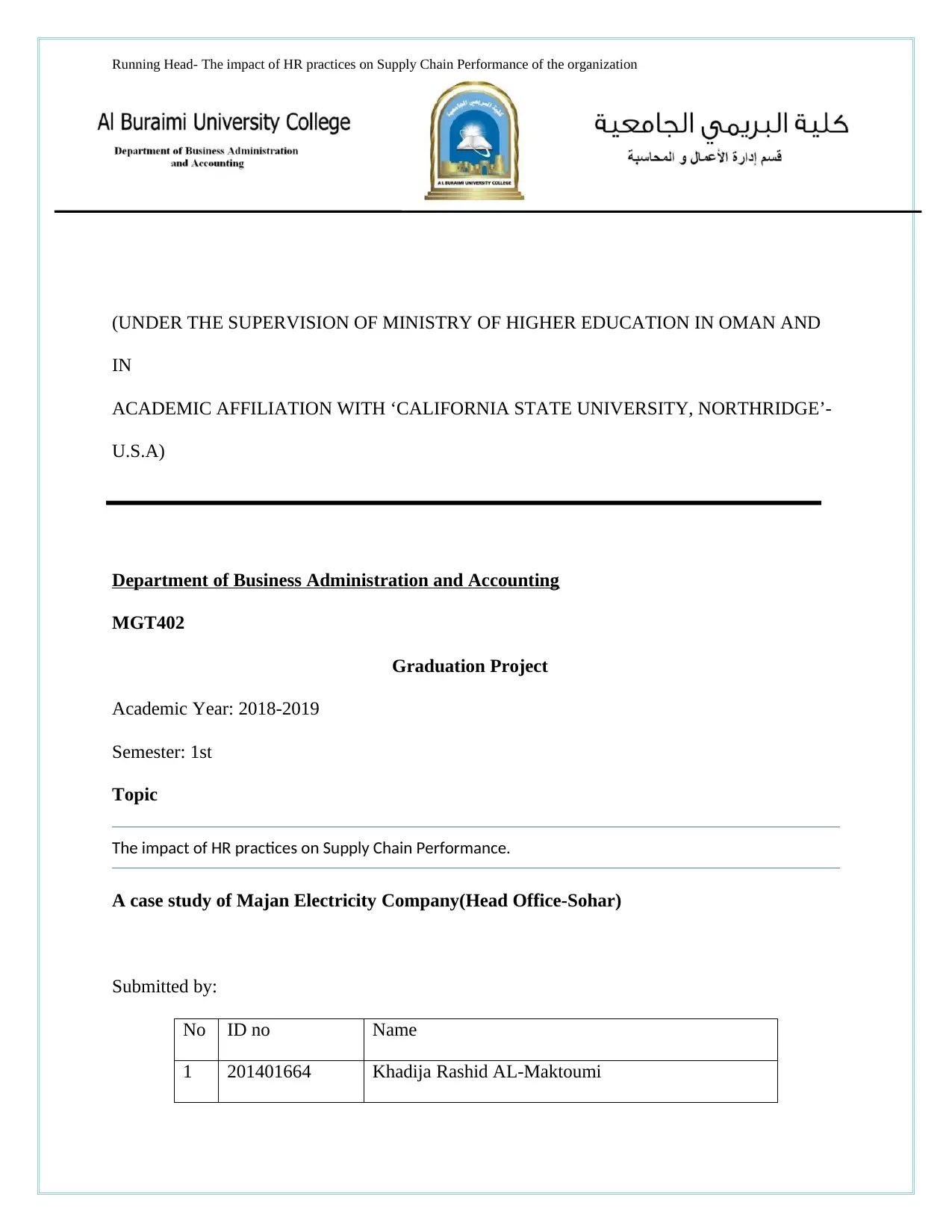
Running Head- The impact of HR practices on Supply Chain Performance of the organization
(UNDER THE SUPERVISION OF MINISTRY OF HIGHER EDUCATION IN OMAN AND
IN
ACADEMIC AFFILIATION WITH ‘CALIFORNIA STATE UNIVERSITY, NORTHRIDGE’-
U.S.A)
Department of Business Administration and Accounting
MGT402
Graduation Project
Academic Year: 2018-2019
Semester: 1st
Topic
The impact of HR practices on Supply Chain Performance.
A case study of Majan Electricity Company(Head Office-Sohar)
Submitted by:
No ID no Name
1 201401664 Khadija Rashid AL-Maktoumi
(UNDER THE SUPERVISION OF MINISTRY OF HIGHER EDUCATION IN OMAN AND
IN
ACADEMIC AFFILIATION WITH ‘CALIFORNIA STATE UNIVERSITY, NORTHRIDGE’-
U.S.A)
Department of Business Administration and Accounting
MGT402
Graduation Project
Academic Year: 2018-2019
Semester: 1st
Topic
The impact of HR practices on Supply Chain Performance.
A case study of Majan Electricity Company(Head Office-Sohar)
Submitted by:
No ID no Name
1 201401664 Khadija Rashid AL-Maktoumi
Paraphrase This Document
Need a fresh take? Get an instant paraphrase of this document with our AI Paraphraser
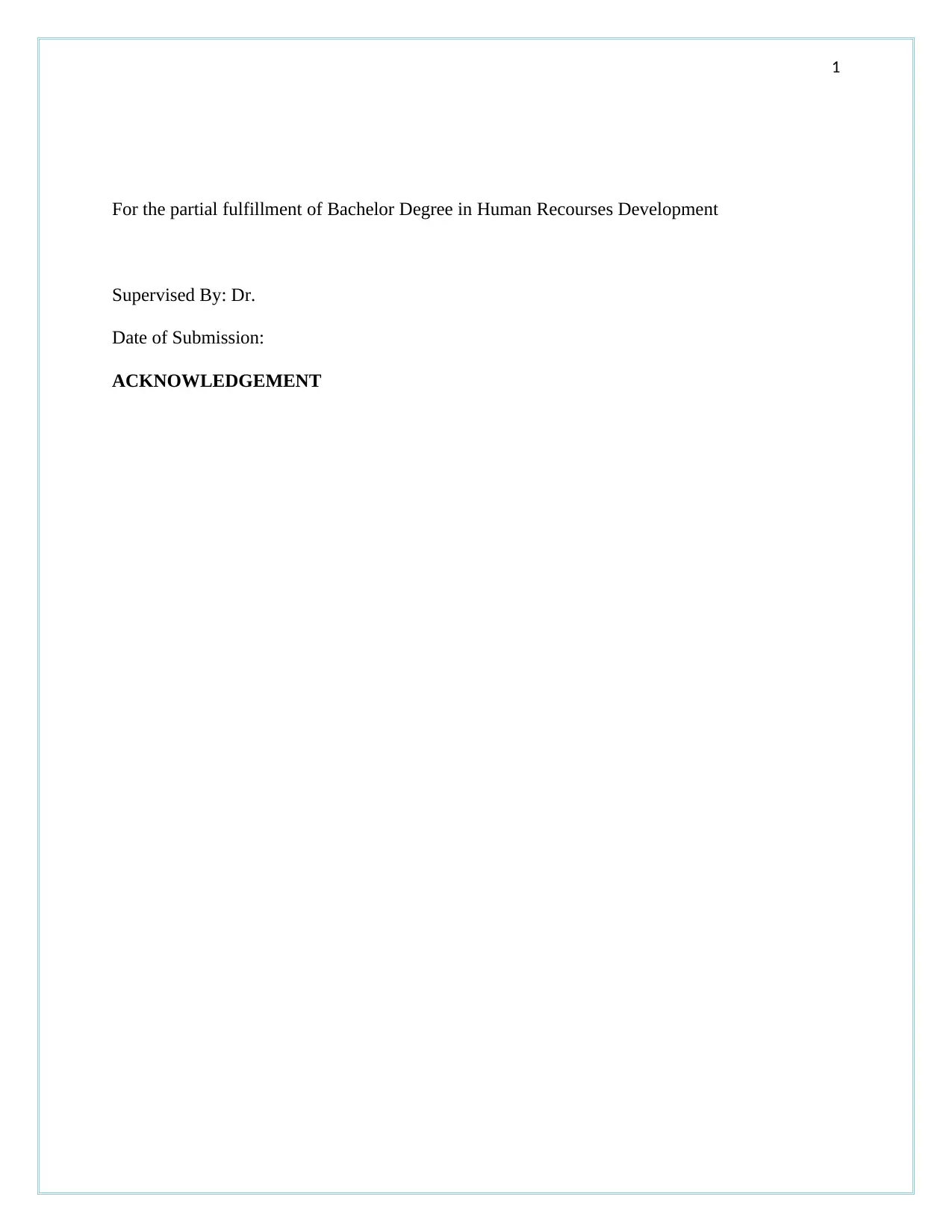
1
For the partial fulfillment of Bachelor Degree in Human Recourses Development
Supervised By: Dr.
Date of Submission:
ACKNOWLEDGEMENT
For the partial fulfillment of Bachelor Degree in Human Recourses Development
Supervised By: Dr.
Date of Submission:
ACKNOWLEDGEMENT

2
DECLARATION
ABSTRACT
DECLARATION
ABSTRACT
⊘ This is a preview!⊘
Do you want full access?
Subscribe today to unlock all pages.

Trusted by 1+ million students worldwide
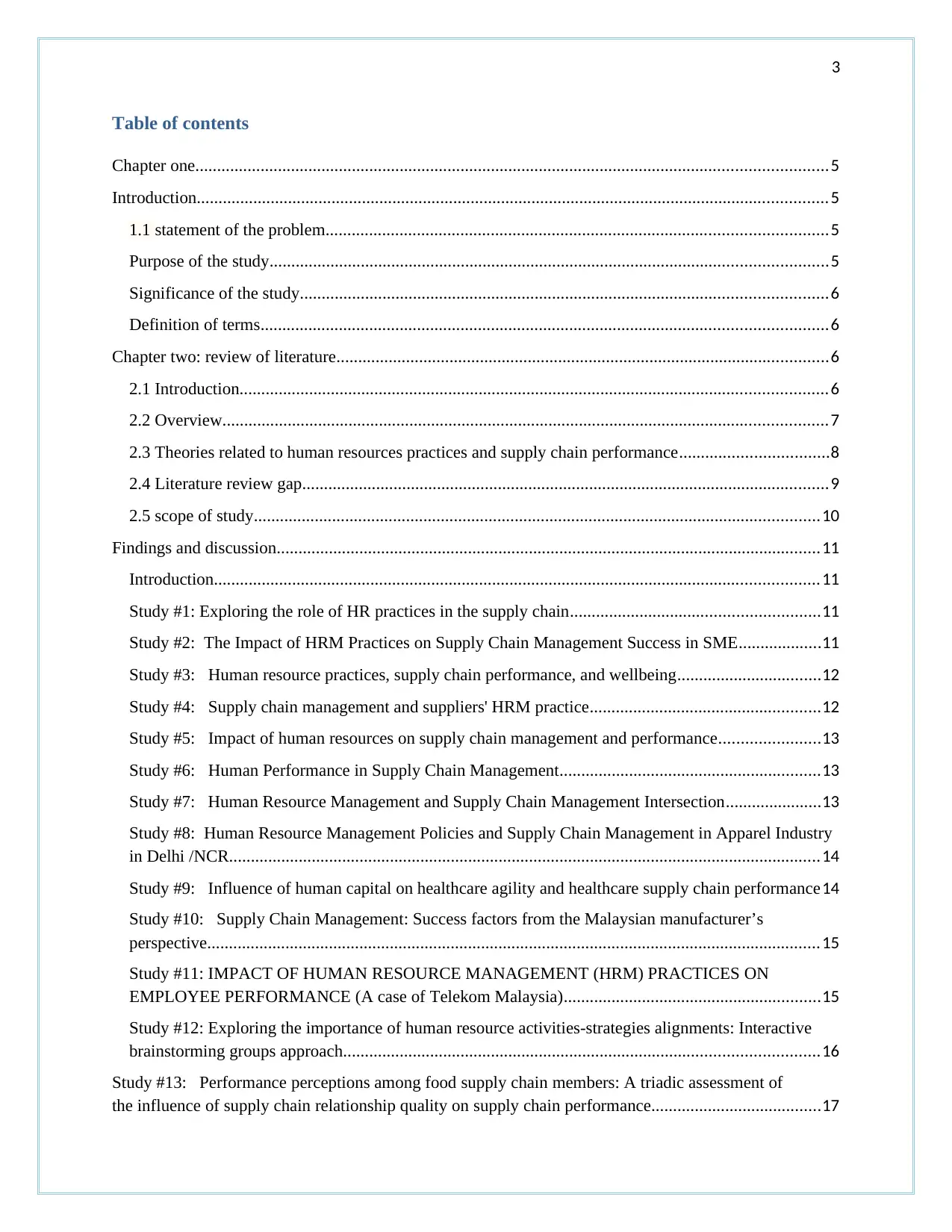
3
Table of contents
Chapter one.................................................................................................................................................5
Introduction.................................................................................................................................................5
1.1 statement of the problem...................................................................................................................5
Purpose of the study................................................................................................................................5
Significance of the study.........................................................................................................................6
Definition of terms..................................................................................................................................6
Chapter two: review of literature.................................................................................................................6
2.1 Introduction.......................................................................................................................................6
2.2 Overview...........................................................................................................................................7
2.3 Theories related to human resources practices and supply chain performance..................................8
2.4 Literature review gap.........................................................................................................................9
2.5 scope of study..................................................................................................................................10
Findings and discussion.............................................................................................................................11
Introduction...........................................................................................................................................11
Study #1: Exploring the role of HR practices in the supply chain.........................................................11
Study #2: The Impact of HRM Practices on Supply Chain Management Success in SME...................11
Study #3: Human resource practices, supply chain performance, and wellbeing.................................12
Study #4: Supply chain management and suppliers' HRM practice.....................................................12
Study #5: Impact of human resources on supply chain management and performance.......................13
Study #6: Human Performance in Supply Chain Management............................................................13
Study #7: Human Resource Management and Supply Chain Management Intersection......................13
Study #8: Human Resource Management Policies and Supply Chain Management in Apparel Industry
in Delhi /NCR........................................................................................................................................14
Study #9: Influence of human capital on healthcare agility and healthcare supply chain performance14
Study #10: Supply Chain Management: Success factors from the Malaysian manufacturer’s
perspective.............................................................................................................................................15
Study #11: IMPACT OF HUMAN RESOURCE MANAGEMENT (HRM) PRACTICES ON
EMPLOYEE PERFORMANCE (A case of Telekom Malaysia)...........................................................15
Study #12: Exploring the importance of human resource activities-strategies alignments: Interactive
brainstorming groups approach.............................................................................................................16
Study #13: Performance perceptions among food supply chain members: A triadic assessment of
the influence of supply chain relationship quality on supply chain performance.......................................17
Table of contents
Chapter one.................................................................................................................................................5
Introduction.................................................................................................................................................5
1.1 statement of the problem...................................................................................................................5
Purpose of the study................................................................................................................................5
Significance of the study.........................................................................................................................6
Definition of terms..................................................................................................................................6
Chapter two: review of literature.................................................................................................................6
2.1 Introduction.......................................................................................................................................6
2.2 Overview...........................................................................................................................................7
2.3 Theories related to human resources practices and supply chain performance..................................8
2.4 Literature review gap.........................................................................................................................9
2.5 scope of study..................................................................................................................................10
Findings and discussion.............................................................................................................................11
Introduction...........................................................................................................................................11
Study #1: Exploring the role of HR practices in the supply chain.........................................................11
Study #2: The Impact of HRM Practices on Supply Chain Management Success in SME...................11
Study #3: Human resource practices, supply chain performance, and wellbeing.................................12
Study #4: Supply chain management and suppliers' HRM practice.....................................................12
Study #5: Impact of human resources on supply chain management and performance.......................13
Study #6: Human Performance in Supply Chain Management............................................................13
Study #7: Human Resource Management and Supply Chain Management Intersection......................13
Study #8: Human Resource Management Policies and Supply Chain Management in Apparel Industry
in Delhi /NCR........................................................................................................................................14
Study #9: Influence of human capital on healthcare agility and healthcare supply chain performance14
Study #10: Supply Chain Management: Success factors from the Malaysian manufacturer’s
perspective.............................................................................................................................................15
Study #11: IMPACT OF HUMAN RESOURCE MANAGEMENT (HRM) PRACTICES ON
EMPLOYEE PERFORMANCE (A case of Telekom Malaysia)...........................................................15
Study #12: Exploring the importance of human resource activities-strategies alignments: Interactive
brainstorming groups approach.............................................................................................................16
Study #13: Performance perceptions among food supply chain members: A triadic assessment of
the influence of supply chain relationship quality on supply chain performance.......................................17
Paraphrase This Document
Need a fresh take? Get an instant paraphrase of this document with our AI Paraphraser
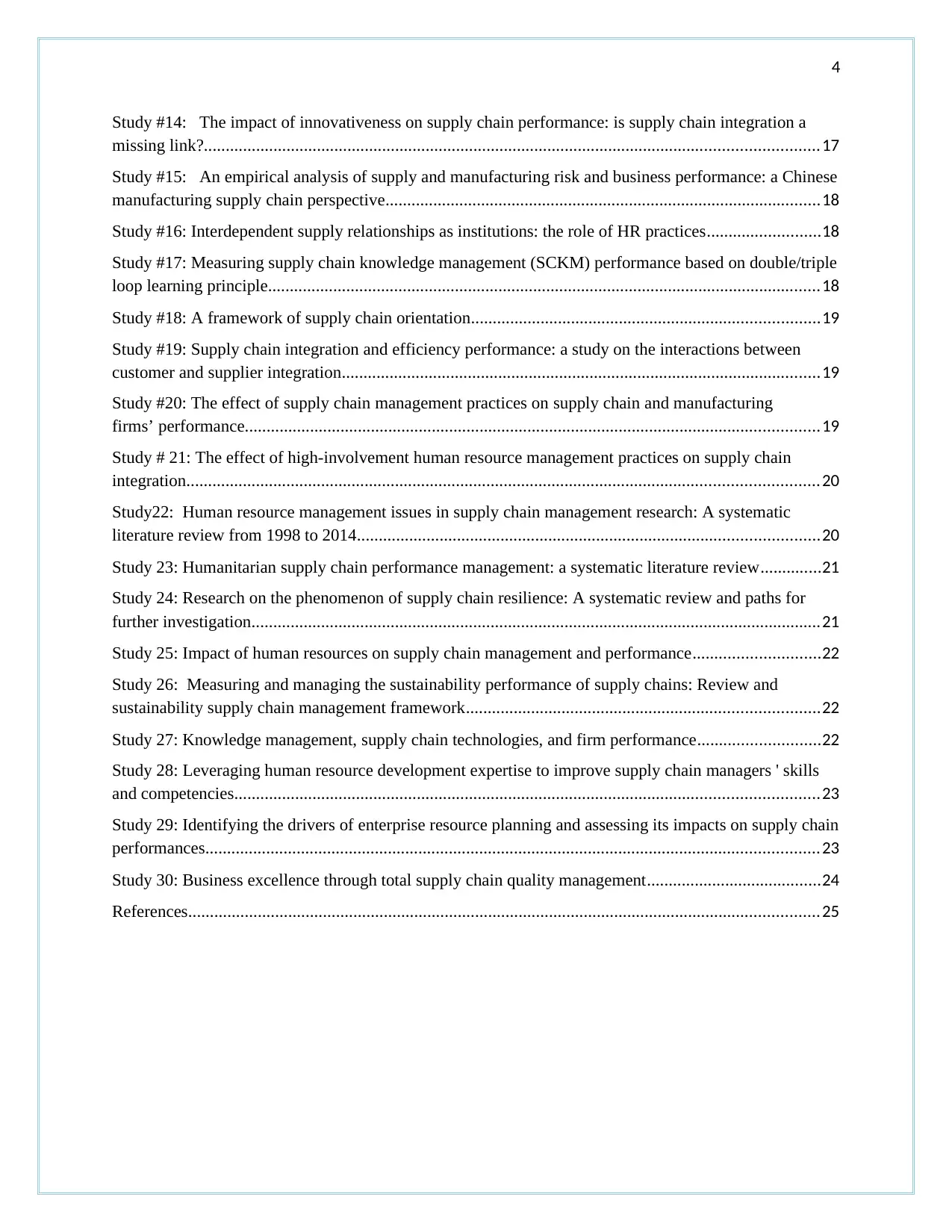
4
Study #14: The impact of innovativeness on supply chain performance: is supply chain integration a
missing link?.............................................................................................................................................17
Study #15: An empirical analysis of supply and manufacturing risk and business performance: a Chinese
manufacturing supply chain perspective....................................................................................................18
Study #16: Interdependent supply relationships as institutions: the role of HR practices..........................18
Study #17: Measuring supply chain knowledge management (SCKM) performance based on double/triple
loop learning principle...............................................................................................................................18
Study #18: A framework of supply chain orientation................................................................................19
Study #19: Supply chain integration and efficiency performance: a study on the interactions between
customer and supplier integration..............................................................................................................19
Study #20: The effect of supply chain management practices on supply chain and manufacturing
firms’ performance....................................................................................................................................19
Study # 21: The effect of high-involvement human resource management practices on supply chain
integration.................................................................................................................................................20
Study22: Human resource management issues in supply chain management research: A systematic
literature review from 1998 to 2014..........................................................................................................20
Study 23: Humanitarian supply chain performance management: a systematic literature review..............21
Study 24: Research on the phenomenon of supply chain resilience: A systematic review and paths for
further investigation...................................................................................................................................21
Study 25: Impact of human resources on supply chain management and performance.............................22
Study 26: Measuring and managing the sustainability performance of supply chains: Review and
sustainability supply chain management framework.................................................................................22
Study 27: Knowledge management, supply chain technologies, and firm performance............................22
Study 28: Leveraging human resource development expertise to improve supply chain managers ' skills
and competencies......................................................................................................................................23
Study 29: Identifying the drivers of enterprise resource planning and assessing its impacts on supply chain
performances.............................................................................................................................................23
Study 30: Business excellence through total supply chain quality management........................................24
References.................................................................................................................................................25
Study #14: The impact of innovativeness on supply chain performance: is supply chain integration a
missing link?.............................................................................................................................................17
Study #15: An empirical analysis of supply and manufacturing risk and business performance: a Chinese
manufacturing supply chain perspective....................................................................................................18
Study #16: Interdependent supply relationships as institutions: the role of HR practices..........................18
Study #17: Measuring supply chain knowledge management (SCKM) performance based on double/triple
loop learning principle...............................................................................................................................18
Study #18: A framework of supply chain orientation................................................................................19
Study #19: Supply chain integration and efficiency performance: a study on the interactions between
customer and supplier integration..............................................................................................................19
Study #20: The effect of supply chain management practices on supply chain and manufacturing
firms’ performance....................................................................................................................................19
Study # 21: The effect of high-involvement human resource management practices on supply chain
integration.................................................................................................................................................20
Study22: Human resource management issues in supply chain management research: A systematic
literature review from 1998 to 2014..........................................................................................................20
Study 23: Humanitarian supply chain performance management: a systematic literature review..............21
Study 24: Research on the phenomenon of supply chain resilience: A systematic review and paths for
further investigation...................................................................................................................................21
Study 25: Impact of human resources on supply chain management and performance.............................22
Study 26: Measuring and managing the sustainability performance of supply chains: Review and
sustainability supply chain management framework.................................................................................22
Study 27: Knowledge management, supply chain technologies, and firm performance............................22
Study 28: Leveraging human resource development expertise to improve supply chain managers ' skills
and competencies......................................................................................................................................23
Study 29: Identifying the drivers of enterprise resource planning and assessing its impacts on supply chain
performances.............................................................................................................................................23
Study 30: Business excellence through total supply chain quality management........................................24
References.................................................................................................................................................25
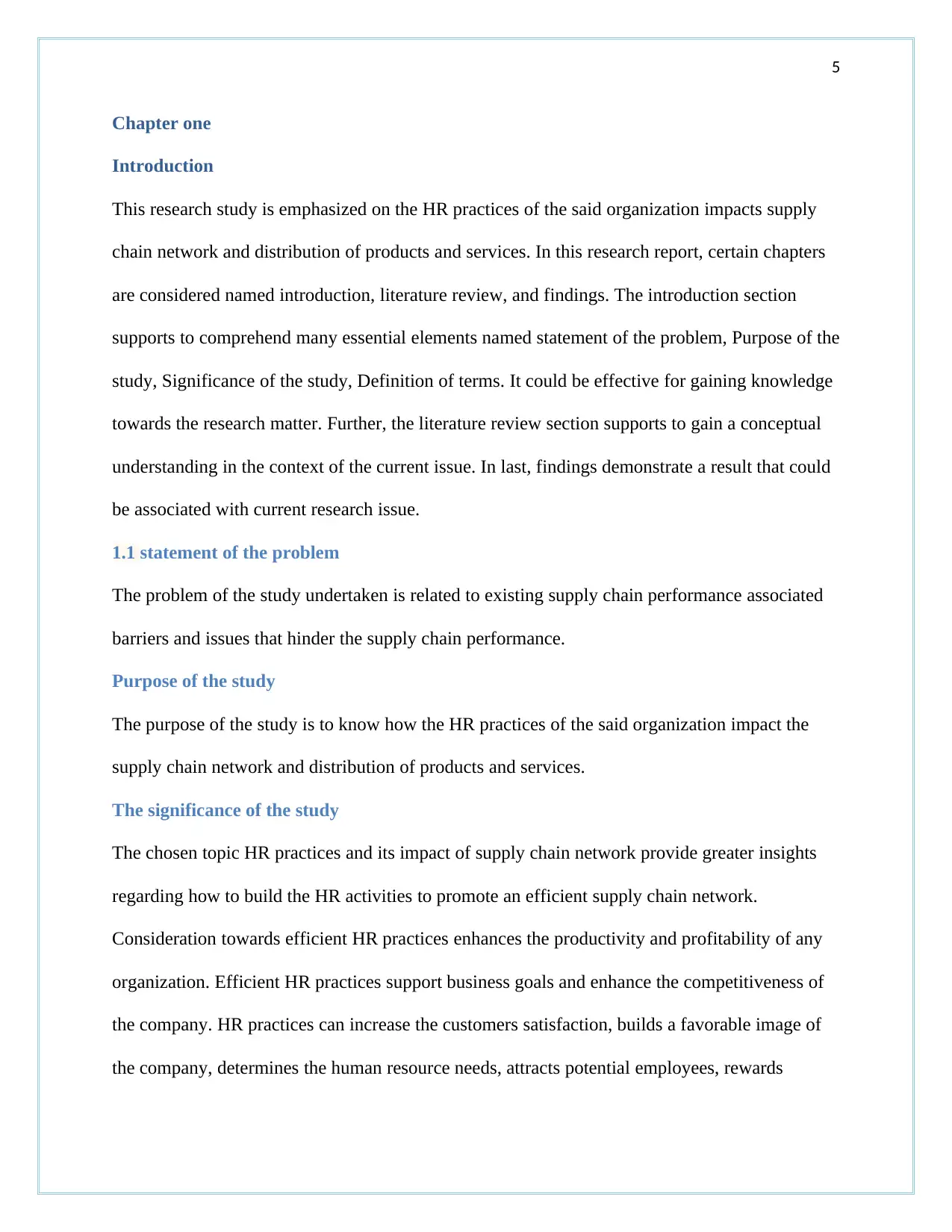
5
Chapter one
Introduction
This research study is emphasized on the HR practices of the said organization impacts supply
chain network and distribution of products and services. In this research report, certain chapters
are considered named introduction, literature review, and findings. The introduction section
supports to comprehend many essential elements named statement of the problem, Purpose of the
study, Significance of the study, Definition of terms. It could be effective for gaining knowledge
towards the research matter. Further, the literature review section supports to gain a conceptual
understanding in the context of the current issue. In last, findings demonstrate a result that could
be associated with current research issue.
1.1 statement of the problem
The problem of the study undertaken is related to existing supply chain performance associated
barriers and issues that hinder the supply chain performance.
Purpose of the study
The purpose of the study is to know how the HR practices of the said organization impact the
supply chain network and distribution of products and services.
The significance of the study
The chosen topic HR practices and its impact of supply chain network provide greater insights
regarding how to build the HR activities to promote an efficient supply chain network.
Consideration towards efficient HR practices enhances the productivity and profitability of any
organization. Efficient HR practices support business goals and enhance the competitiveness of
the company. HR practices can increase the customers satisfaction, builds a favorable image of
the company, determines the human resource needs, attracts potential employees, rewards
Chapter one
Introduction
This research study is emphasized on the HR practices of the said organization impacts supply
chain network and distribution of products and services. In this research report, certain chapters
are considered named introduction, literature review, and findings. The introduction section
supports to comprehend many essential elements named statement of the problem, Purpose of the
study, Significance of the study, Definition of terms. It could be effective for gaining knowledge
towards the research matter. Further, the literature review section supports to gain a conceptual
understanding in the context of the current issue. In last, findings demonstrate a result that could
be associated with current research issue.
1.1 statement of the problem
The problem of the study undertaken is related to existing supply chain performance associated
barriers and issues that hinder the supply chain performance.
Purpose of the study
The purpose of the study is to know how the HR practices of the said organization impact the
supply chain network and distribution of products and services.
The significance of the study
The chosen topic HR practices and its impact of supply chain network provide greater insights
regarding how to build the HR activities to promote an efficient supply chain network.
Consideration towards efficient HR practices enhances the productivity and profitability of any
organization. Efficient HR practices support business goals and enhance the competitiveness of
the company. HR practices can increase the customers satisfaction, builds a favorable image of
the company, determines the human resource needs, attracts potential employees, rewards
⊘ This is a preview!⊘
Do you want full access?
Subscribe today to unlock all pages.

Trusted by 1+ million students worldwide
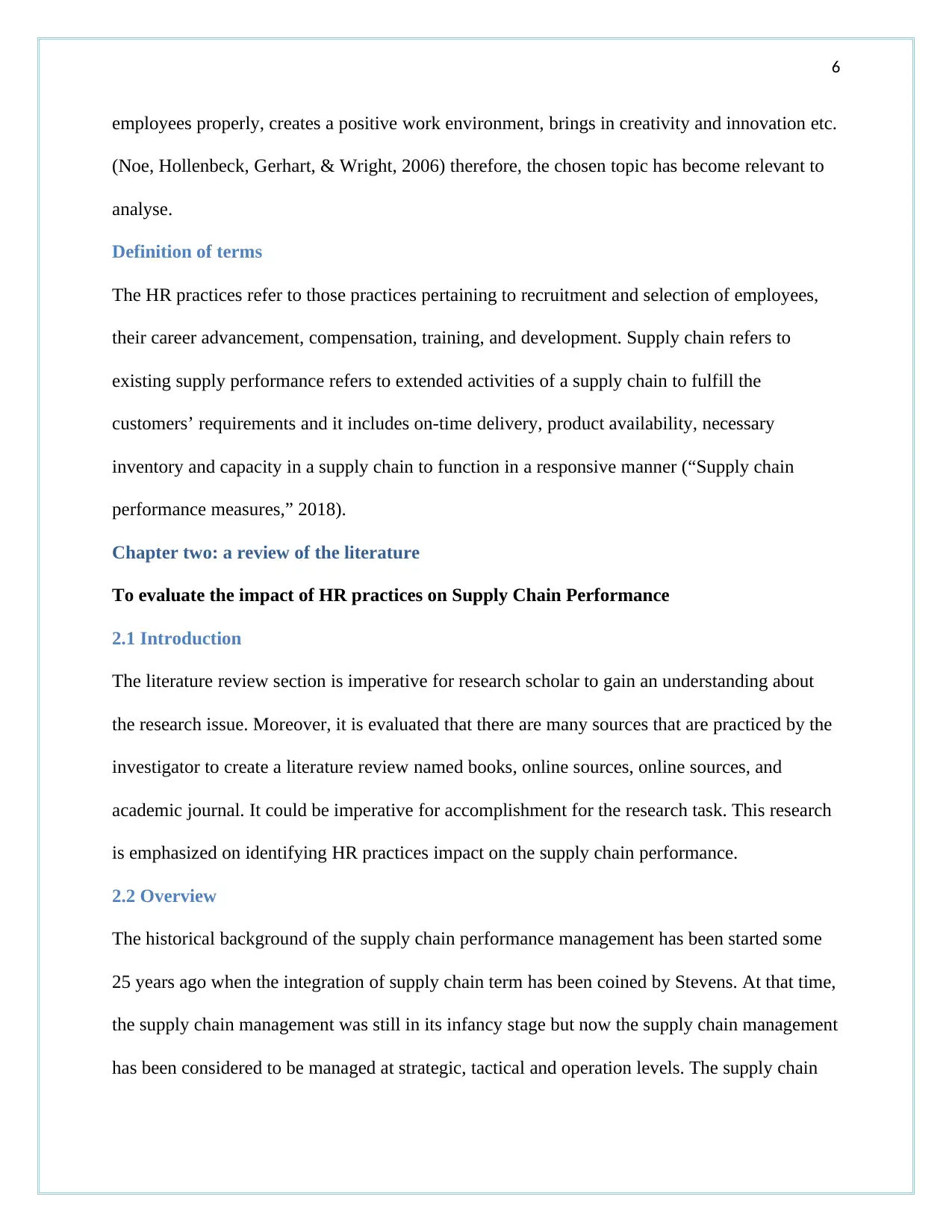
6
employees properly, creates a positive work environment, brings in creativity and innovation etc.
(Noe, Hollenbeck, Gerhart, & Wright, 2006) therefore, the chosen topic has become relevant to
analyse.
Definition of terms
The HR practices refer to those practices pertaining to recruitment and selection of employees,
their career advancement, compensation, training, and development. Supply chain refers to
existing supply performance refers to extended activities of a supply chain to fulfill the
customers’ requirements and it includes on-time delivery, product availability, necessary
inventory and capacity in a supply chain to function in a responsive manner (“Supply chain
performance measures,” 2018).
Chapter two: a review of the literature
To evaluate the impact of HR practices on Supply Chain Performance
2.1 Introduction
The literature review section is imperative for research scholar to gain an understanding about
the research issue. Moreover, it is evaluated that there are many sources that are practiced by the
investigator to create a literature review named books, online sources, online sources, and
academic journal. It could be imperative for accomplishment for the research task. This research
is emphasized on identifying HR practices impact on the supply chain performance.
2.2 Overview
The historical background of the supply chain performance management has been started some
25 years ago when the integration of supply chain term has been coined by Stevens. At that time,
the supply chain management was still in its infancy stage but now the supply chain management
has been considered to be managed at strategic, tactical and operation levels. The supply chain
employees properly, creates a positive work environment, brings in creativity and innovation etc.
(Noe, Hollenbeck, Gerhart, & Wright, 2006) therefore, the chosen topic has become relevant to
analyse.
Definition of terms
The HR practices refer to those practices pertaining to recruitment and selection of employees,
their career advancement, compensation, training, and development. Supply chain refers to
existing supply performance refers to extended activities of a supply chain to fulfill the
customers’ requirements and it includes on-time delivery, product availability, necessary
inventory and capacity in a supply chain to function in a responsive manner (“Supply chain
performance measures,” 2018).
Chapter two: a review of the literature
To evaluate the impact of HR practices on Supply Chain Performance
2.1 Introduction
The literature review section is imperative for research scholar to gain an understanding about
the research issue. Moreover, it is evaluated that there are many sources that are practiced by the
investigator to create a literature review named books, online sources, online sources, and
academic journal. It could be imperative for accomplishment for the research task. This research
is emphasized on identifying HR practices impact on the supply chain performance.
2.2 Overview
The historical background of the supply chain performance management has been started some
25 years ago when the integration of supply chain term has been coined by Stevens. At that time,
the supply chain management was still in its infancy stage but now the supply chain management
has been considered to be managed at strategic, tactical and operation levels. The supply chain
Paraphrase This Document
Need a fresh take? Get an instant paraphrase of this document with our AI Paraphraser
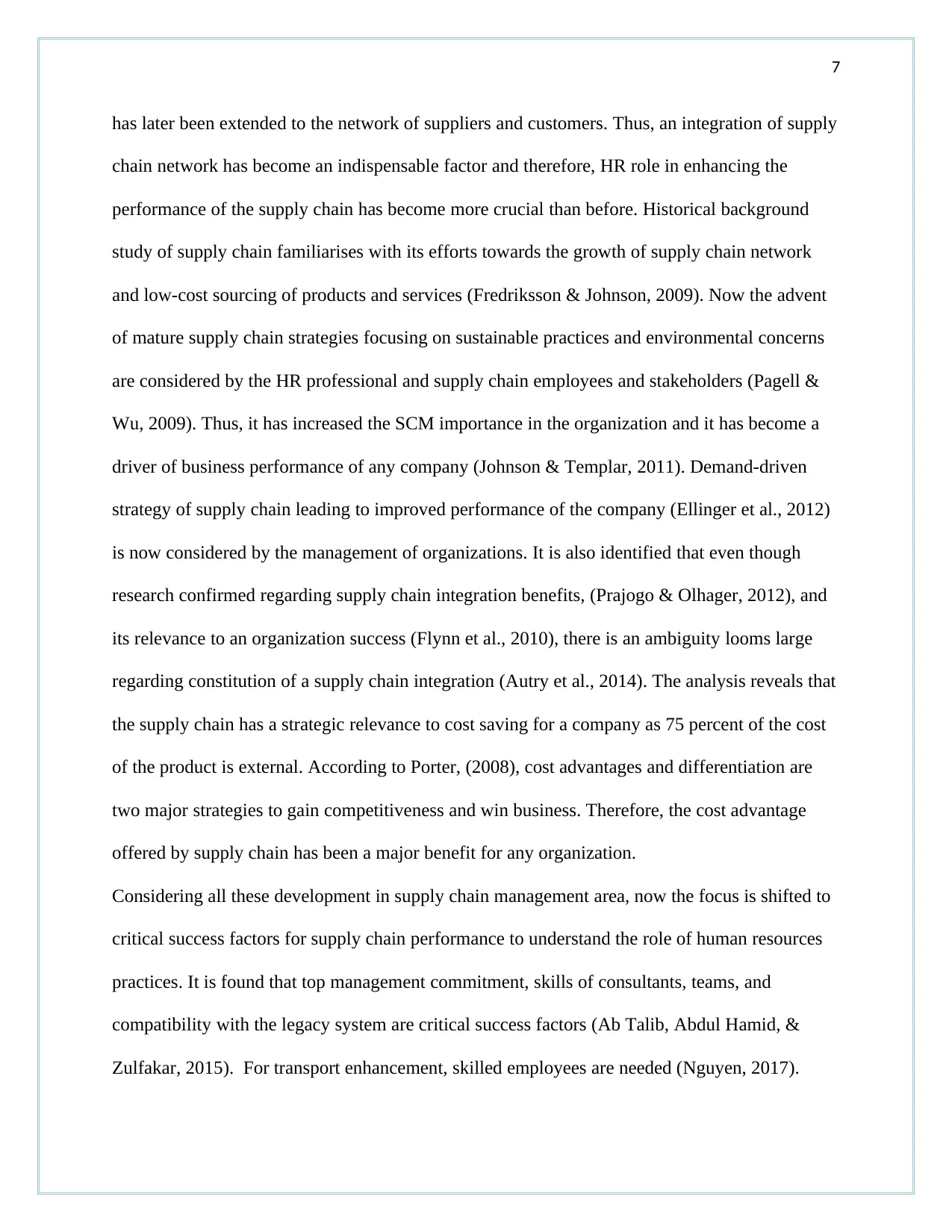
7
has later been extended to the network of suppliers and customers. Thus, an integration of supply
chain network has become an indispensable factor and therefore, HR role in enhancing the
performance of the supply chain has become more crucial than before. Historical background
study of supply chain familiarises with its efforts towards the growth of supply chain network
and low-cost sourcing of products and services (Fredriksson & Johnson, 2009). Now the advent
of mature supply chain strategies focusing on sustainable practices and environmental concerns
are considered by the HR professional and supply chain employees and stakeholders (Pagell &
Wu, 2009). Thus, it has increased the SCM importance in the organization and it has become a
driver of business performance of any company (Johnson & Templar, 2011). Demand-driven
strategy of supply chain leading to improved performance of the company (Ellinger et al., 2012)
is now considered by the management of organizations. It is also identified that even though
research confirmed regarding supply chain integration benefits, (Prajogo & Olhager, 2012), and
its relevance to an organization success (Flynn et al., 2010), there is an ambiguity looms large
regarding constitution of a supply chain integration (Autry et al., 2014). The analysis reveals that
the supply chain has a strategic relevance to cost saving for a company as 75 percent of the cost
of the product is external. According to Porter, (2008), cost advantages and differentiation are
two major strategies to gain competitiveness and win business. Therefore, the cost advantage
offered by supply chain has been a major benefit for any organization.
Considering all these development in supply chain management area, now the focus is shifted to
critical success factors for supply chain performance to understand the role of human resources
practices. It is found that top management commitment, skills of consultants, teams, and
compatibility with the legacy system are critical success factors (Ab Talib, Abdul Hamid, &
Zulfakar, 2015). For transport enhancement, skilled employees are needed (Nguyen, 2017).
has later been extended to the network of suppliers and customers. Thus, an integration of supply
chain network has become an indispensable factor and therefore, HR role in enhancing the
performance of the supply chain has become more crucial than before. Historical background
study of supply chain familiarises with its efforts towards the growth of supply chain network
and low-cost sourcing of products and services (Fredriksson & Johnson, 2009). Now the advent
of mature supply chain strategies focusing on sustainable practices and environmental concerns
are considered by the HR professional and supply chain employees and stakeholders (Pagell &
Wu, 2009). Thus, it has increased the SCM importance in the organization and it has become a
driver of business performance of any company (Johnson & Templar, 2011). Demand-driven
strategy of supply chain leading to improved performance of the company (Ellinger et al., 2012)
is now considered by the management of organizations. It is also identified that even though
research confirmed regarding supply chain integration benefits, (Prajogo & Olhager, 2012), and
its relevance to an organization success (Flynn et al., 2010), there is an ambiguity looms large
regarding constitution of a supply chain integration (Autry et al., 2014). The analysis reveals that
the supply chain has a strategic relevance to cost saving for a company as 75 percent of the cost
of the product is external. According to Porter, (2008), cost advantages and differentiation are
two major strategies to gain competitiveness and win business. Therefore, the cost advantage
offered by supply chain has been a major benefit for any organization.
Considering all these development in supply chain management area, now the focus is shifted to
critical success factors for supply chain performance to understand the role of human resources
practices. It is found that top management commitment, skills of consultants, teams, and
compatibility with the legacy system are critical success factors (Ab Talib, Abdul Hamid, &
Zulfakar, 2015). For transport enhancement, skilled employees are needed (Nguyen, 2017).
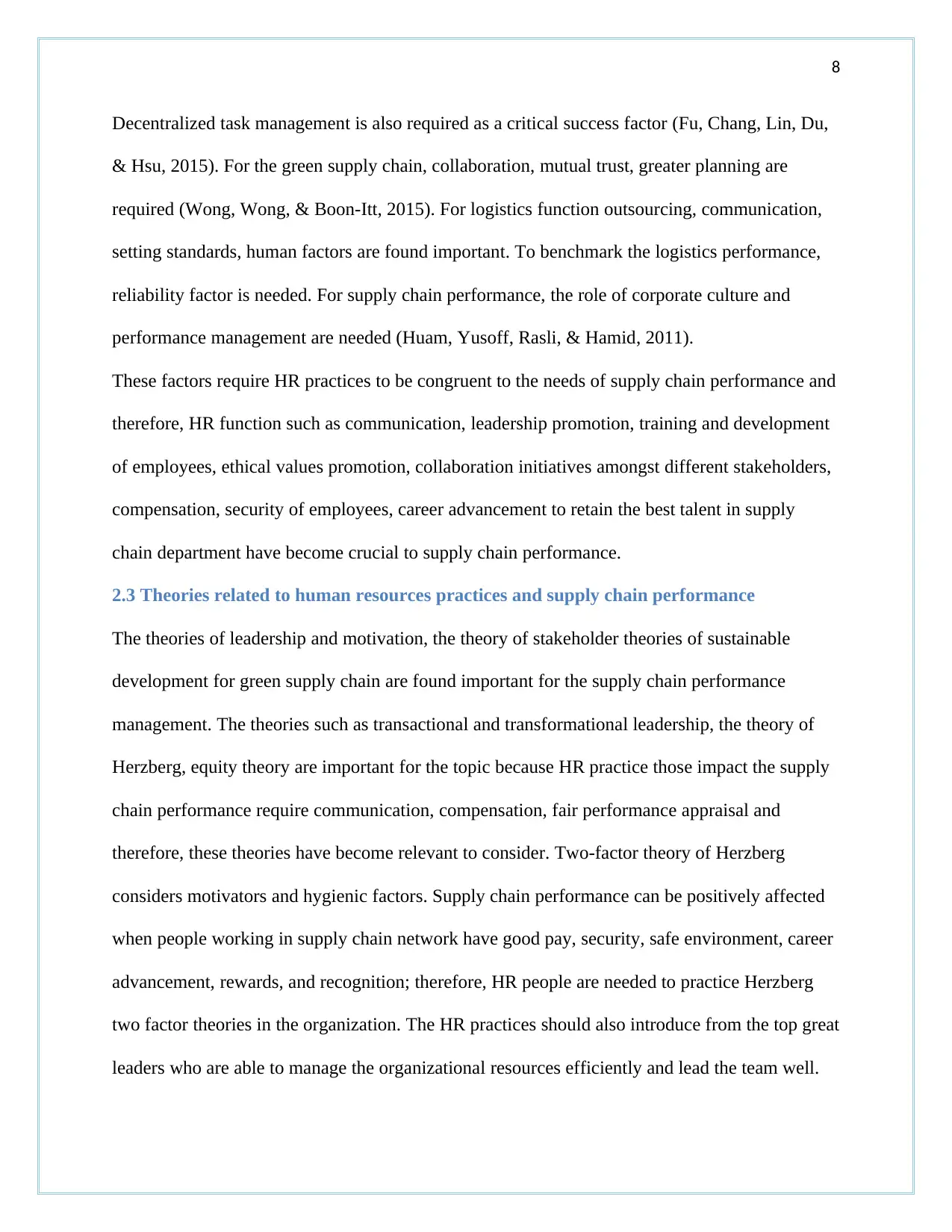
8
Decentralized task management is also required as a critical success factor (Fu, Chang, Lin, Du,
& Hsu, 2015). For the green supply chain, collaboration, mutual trust, greater planning are
required (Wong, Wong, & Boon-Itt, 2015). For logistics function outsourcing, communication,
setting standards, human factors are found important. To benchmark the logistics performance,
reliability factor is needed. For supply chain performance, the role of corporate culture and
performance management are needed (Huam, Yusoff, Rasli, & Hamid, 2011).
These factors require HR practices to be congruent to the needs of supply chain performance and
therefore, HR function such as communication, leadership promotion, training and development
of employees, ethical values promotion, collaboration initiatives amongst different stakeholders,
compensation, security of employees, career advancement to retain the best talent in supply
chain department have become crucial to supply chain performance.
2.3 Theories related to human resources practices and supply chain performance
The theories of leadership and motivation, the theory of stakeholder theories of sustainable
development for green supply chain are found important for the supply chain performance
management. The theories such as transactional and transformational leadership, the theory of
Herzberg, equity theory are important for the topic because HR practice those impact the supply
chain performance require communication, compensation, fair performance appraisal and
therefore, these theories have become relevant to consider. Two-factor theory of Herzberg
considers motivators and hygienic factors. Supply chain performance can be positively affected
when people working in supply chain network have good pay, security, safe environment, career
advancement, rewards, and recognition; therefore, HR people are needed to practice Herzberg
two factor theories in the organization. The HR practices should also introduce from the top great
leaders who are able to manage the organizational resources efficiently and lead the team well.
Decentralized task management is also required as a critical success factor (Fu, Chang, Lin, Du,
& Hsu, 2015). For the green supply chain, collaboration, mutual trust, greater planning are
required (Wong, Wong, & Boon-Itt, 2015). For logistics function outsourcing, communication,
setting standards, human factors are found important. To benchmark the logistics performance,
reliability factor is needed. For supply chain performance, the role of corporate culture and
performance management are needed (Huam, Yusoff, Rasli, & Hamid, 2011).
These factors require HR practices to be congruent to the needs of supply chain performance and
therefore, HR function such as communication, leadership promotion, training and development
of employees, ethical values promotion, collaboration initiatives amongst different stakeholders,
compensation, security of employees, career advancement to retain the best talent in supply
chain department have become crucial to supply chain performance.
2.3 Theories related to human resources practices and supply chain performance
The theories of leadership and motivation, the theory of stakeholder theories of sustainable
development for green supply chain are found important for the supply chain performance
management. The theories such as transactional and transformational leadership, the theory of
Herzberg, equity theory are important for the topic because HR practice those impact the supply
chain performance require communication, compensation, fair performance appraisal and
therefore, these theories have become relevant to consider. Two-factor theory of Herzberg
considers motivators and hygienic factors. Supply chain performance can be positively affected
when people working in supply chain network have good pay, security, safe environment, career
advancement, rewards, and recognition; therefore, HR people are needed to practice Herzberg
two factor theories in the organization. The HR practices should also introduce from the top great
leaders who are able to manage the organizational resources efficiently and lead the team well.
⊘ This is a preview!⊘
Do you want full access?
Subscribe today to unlock all pages.

Trusted by 1+ million students worldwide
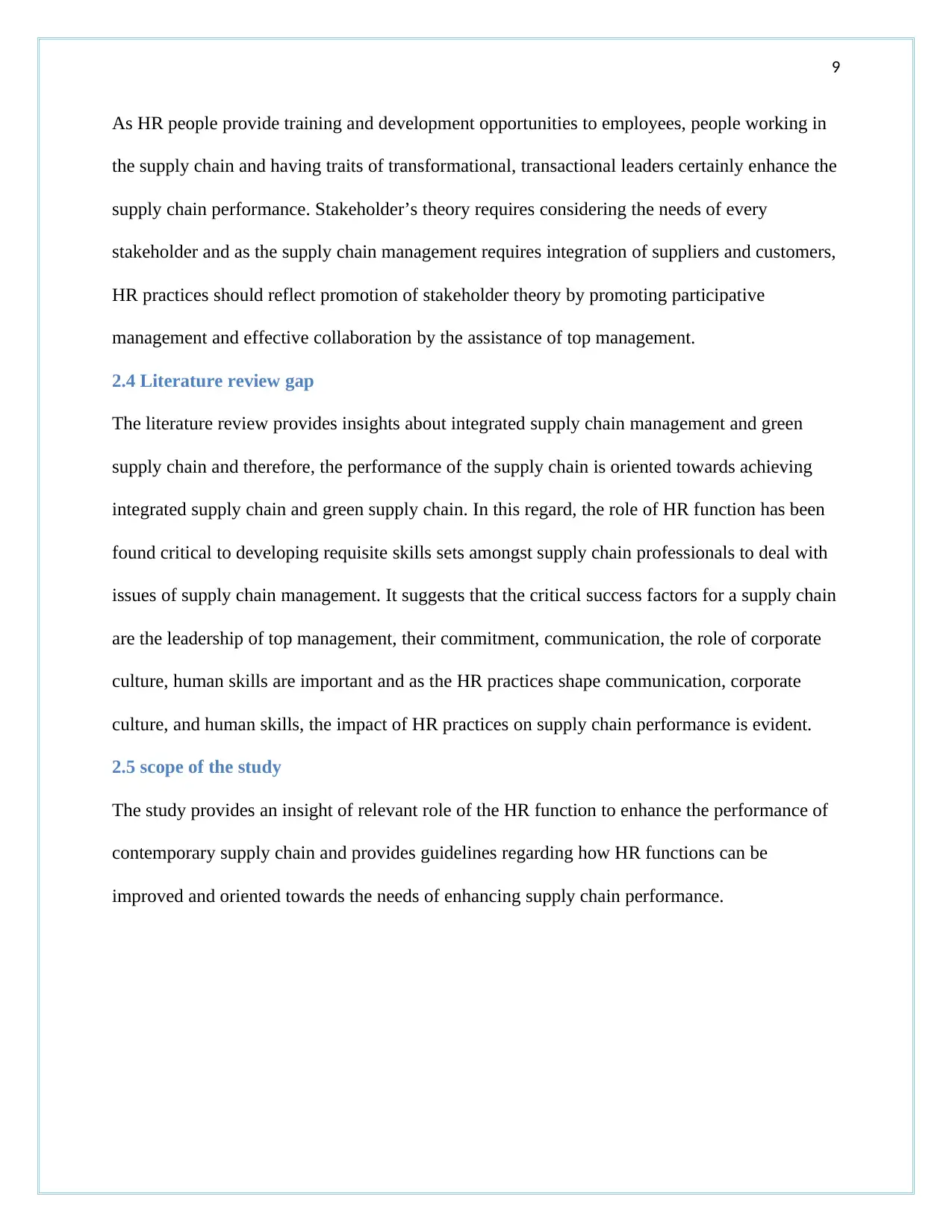
9
As HR people provide training and development opportunities to employees, people working in
the supply chain and having traits of transformational, transactional leaders certainly enhance the
supply chain performance. Stakeholder’s theory requires considering the needs of every
stakeholder and as the supply chain management requires integration of suppliers and customers,
HR practices should reflect promotion of stakeholder theory by promoting participative
management and effective collaboration by the assistance of top management.
2.4 Literature review gap
The literature review provides insights about integrated supply chain management and green
supply chain and therefore, the performance of the supply chain is oriented towards achieving
integrated supply chain and green supply chain. In this regard, the role of HR function has been
found critical to developing requisite skills sets amongst supply chain professionals to deal with
issues of supply chain management. It suggests that the critical success factors for a supply chain
are the leadership of top management, their commitment, communication, the role of corporate
culture, human skills are important and as the HR practices shape communication, corporate
culture, and human skills, the impact of HR practices on supply chain performance is evident.
2.5 scope of the study
The study provides an insight of relevant role of the HR function to enhance the performance of
contemporary supply chain and provides guidelines regarding how HR functions can be
improved and oriented towards the needs of enhancing supply chain performance.
As HR people provide training and development opportunities to employees, people working in
the supply chain and having traits of transformational, transactional leaders certainly enhance the
supply chain performance. Stakeholder’s theory requires considering the needs of every
stakeholder and as the supply chain management requires integration of suppliers and customers,
HR practices should reflect promotion of stakeholder theory by promoting participative
management and effective collaboration by the assistance of top management.
2.4 Literature review gap
The literature review provides insights about integrated supply chain management and green
supply chain and therefore, the performance of the supply chain is oriented towards achieving
integrated supply chain and green supply chain. In this regard, the role of HR function has been
found critical to developing requisite skills sets amongst supply chain professionals to deal with
issues of supply chain management. It suggests that the critical success factors for a supply chain
are the leadership of top management, their commitment, communication, the role of corporate
culture, human skills are important and as the HR practices shape communication, corporate
culture, and human skills, the impact of HR practices on supply chain performance is evident.
2.5 scope of the study
The study provides an insight of relevant role of the HR function to enhance the performance of
contemporary supply chain and provides guidelines regarding how HR functions can be
improved and oriented towards the needs of enhancing supply chain performance.
Paraphrase This Document
Need a fresh take? Get an instant paraphrase of this document with our AI Paraphraser
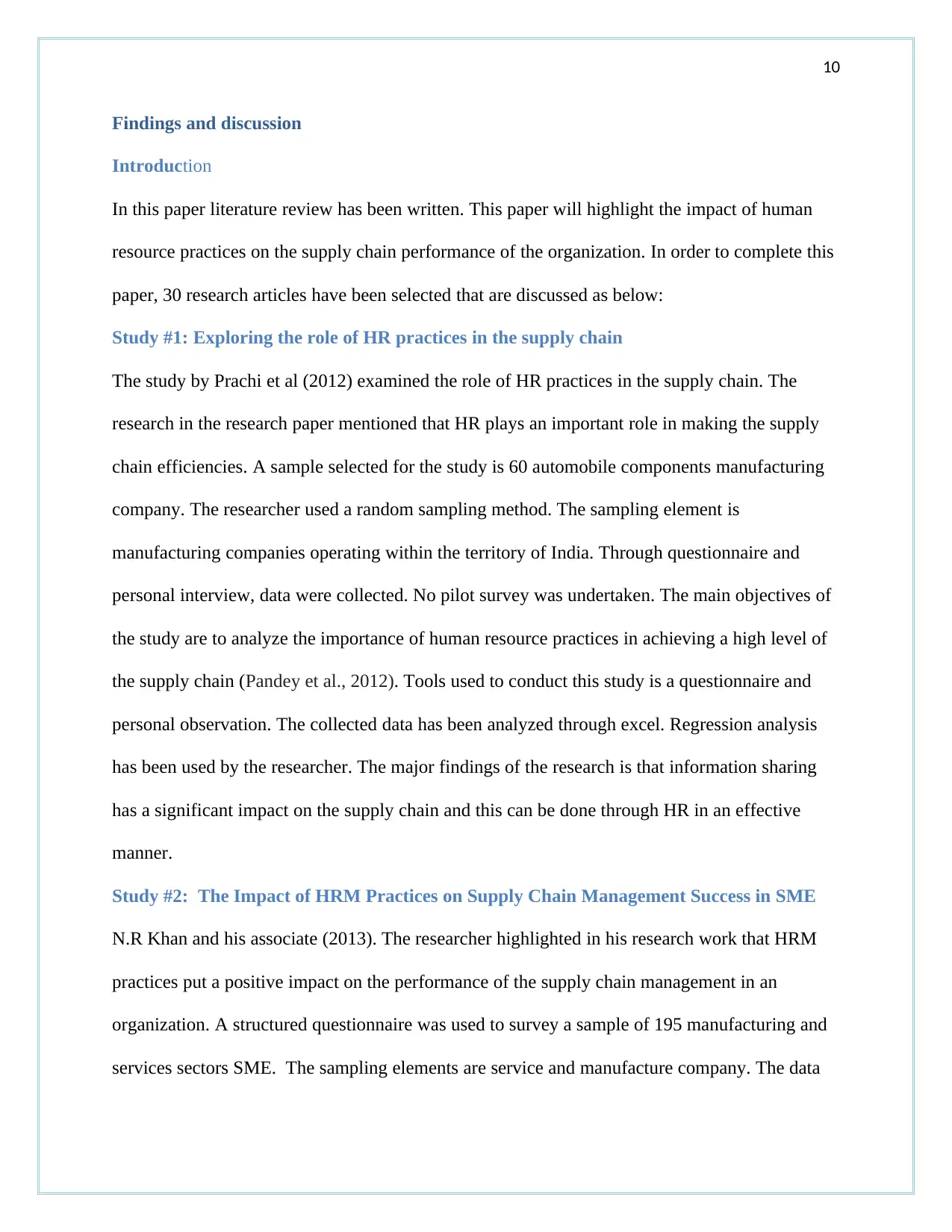
10
Findings and discussion
Introduction
In this paper literature review has been written. This paper will highlight the impact of human
resource practices on the supply chain performance of the organization. In order to complete this
paper, 30 research articles have been selected that are discussed as below:
Study #1: Exploring the role of HR practices in the supply chain
The study by Prachi et al (2012) examined the role of HR practices in the supply chain. The
research in the research paper mentioned that HR plays an important role in making the supply
chain efficiencies. A sample selected for the study is 60 automobile components manufacturing
company. The researcher used a random sampling method. The sampling element is
manufacturing companies operating within the territory of India. Through questionnaire and
personal interview, data were collected. No pilot survey was undertaken. The main objectives of
the study are to analyze the importance of human resource practices in achieving a high level of
the supply chain (Pandey et al., 2012). Tools used to conduct this study is a questionnaire and
personal observation. The collected data has been analyzed through excel. Regression analysis
has been used by the researcher. The major findings of the research is that information sharing
has a significant impact on the supply chain and this can be done through HR in an effective
manner.
Study #2: The Impact of HRM Practices on Supply Chain Management Success in SME
N.R Khan and his associate (2013). The researcher highlighted in his research work that HRM
practices put a positive impact on the performance of the supply chain management in an
organization. A structured questionnaire was used to survey a sample of 195 manufacturing and
services sectors SME. The sampling elements are service and manufacture company. The data
Findings and discussion
Introduction
In this paper literature review has been written. This paper will highlight the impact of human
resource practices on the supply chain performance of the organization. In order to complete this
paper, 30 research articles have been selected that are discussed as below:
Study #1: Exploring the role of HR practices in the supply chain
The study by Prachi et al (2012) examined the role of HR practices in the supply chain. The
research in the research paper mentioned that HR plays an important role in making the supply
chain efficiencies. A sample selected for the study is 60 automobile components manufacturing
company. The researcher used a random sampling method. The sampling element is
manufacturing companies operating within the territory of India. Through questionnaire and
personal interview, data were collected. No pilot survey was undertaken. The main objectives of
the study are to analyze the importance of human resource practices in achieving a high level of
the supply chain (Pandey et al., 2012). Tools used to conduct this study is a questionnaire and
personal observation. The collected data has been analyzed through excel. Regression analysis
has been used by the researcher. The major findings of the research is that information sharing
has a significant impact on the supply chain and this can be done through HR in an effective
manner.
Study #2: The Impact of HRM Practices on Supply Chain Management Success in SME
N.R Khan and his associate (2013). The researcher highlighted in his research work that HRM
practices put a positive impact on the performance of the supply chain management in an
organization. A structured questionnaire was used to survey a sample of 195 manufacturing and
services sectors SME. The sampling elements are service and manufacture company. The data
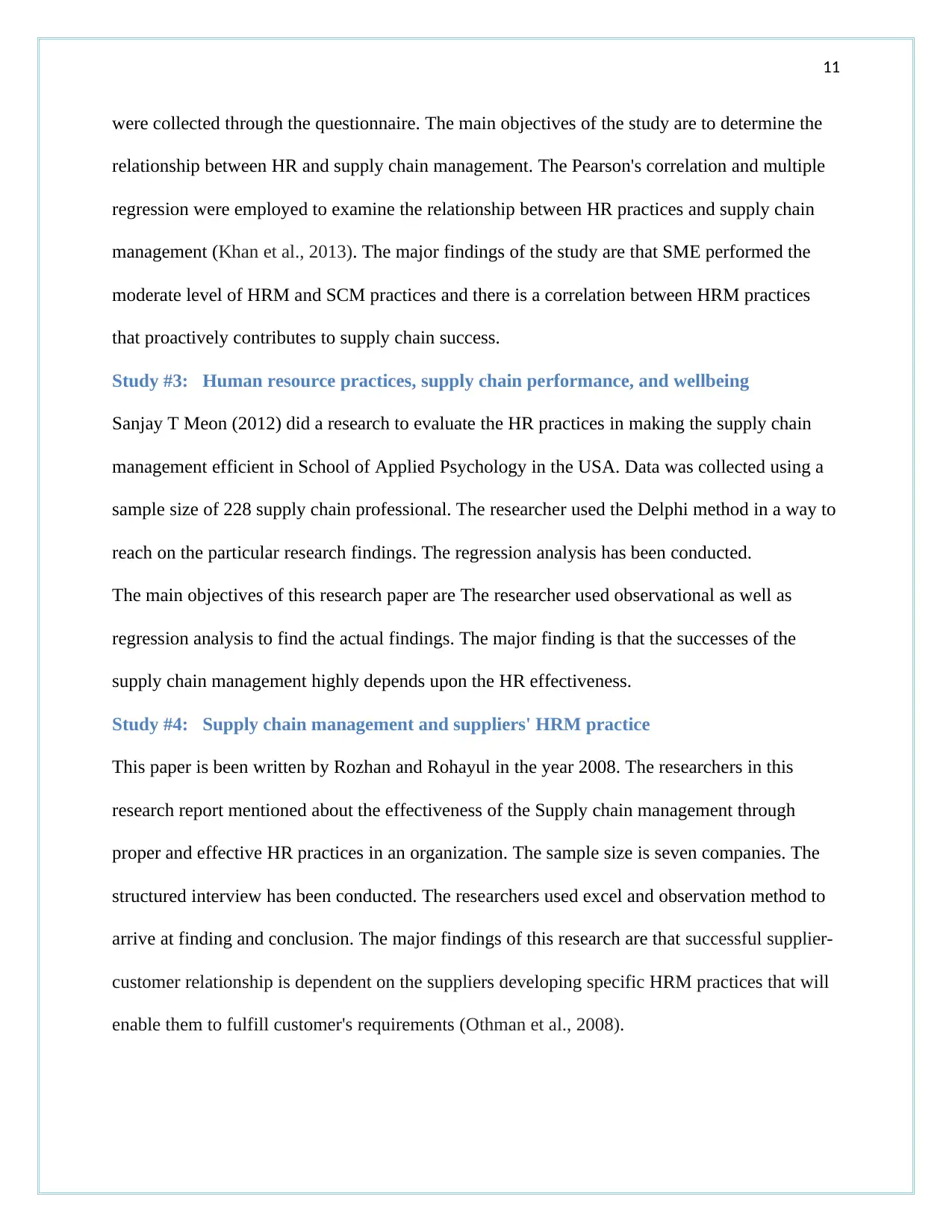
11
were collected through the questionnaire. The main objectives of the study are to determine the
relationship between HR and supply chain management. The Pearson's correlation and multiple
regression were employed to examine the relationship between HR practices and supply chain
management (Khan et al., 2013). The major findings of the study are that SME performed the
moderate level of HRM and SCM practices and there is a correlation between HRM practices
that proactively contributes to supply chain success.
Study #3: Human resource practices, supply chain performance, and wellbeing
Sanjay T Meon (2012) did a research to evaluate the HR practices in making the supply chain
management efficient in School of Applied Psychology in the USA. Data was collected using a
sample size of 228 supply chain professional. The researcher used the Delphi method in a way to
reach on the particular research findings. The regression analysis has been conducted.
The main objectives of this research paper are The researcher used observational as well as
regression analysis to find the actual findings. The major finding is that the successes of the
supply chain management highly depends upon the HR effectiveness.
Study #4: Supply chain management and suppliers' HRM practice
This paper is been written by Rozhan and Rohayul in the year 2008. The researchers in this
research report mentioned about the effectiveness of the Supply chain management through
proper and effective HR practices in an organization. The sample size is seven companies. The
structured interview has been conducted. The researchers used excel and observation method to
arrive at finding and conclusion. The major findings of this research are that successful supplier-
customer relationship is dependent on the suppliers developing specific HRM practices that will
enable them to fulfill customer's requirements (Othman et al., 2008).
were collected through the questionnaire. The main objectives of the study are to determine the
relationship between HR and supply chain management. The Pearson's correlation and multiple
regression were employed to examine the relationship between HR practices and supply chain
management (Khan et al., 2013). The major findings of the study are that SME performed the
moderate level of HRM and SCM practices and there is a correlation between HRM practices
that proactively contributes to supply chain success.
Study #3: Human resource practices, supply chain performance, and wellbeing
Sanjay T Meon (2012) did a research to evaluate the HR practices in making the supply chain
management efficient in School of Applied Psychology in the USA. Data was collected using a
sample size of 228 supply chain professional. The researcher used the Delphi method in a way to
reach on the particular research findings. The regression analysis has been conducted.
The main objectives of this research paper are The researcher used observational as well as
regression analysis to find the actual findings. The major finding is that the successes of the
supply chain management highly depends upon the HR effectiveness.
Study #4: Supply chain management and suppliers' HRM practice
This paper is been written by Rozhan and Rohayul in the year 2008. The researchers in this
research report mentioned about the effectiveness of the Supply chain management through
proper and effective HR practices in an organization. The sample size is seven companies. The
structured interview has been conducted. The researchers used excel and observation method to
arrive at finding and conclusion. The major findings of this research are that successful supplier-
customer relationship is dependent on the suppliers developing specific HRM practices that will
enable them to fulfill customer's requirements (Othman et al., 2008).
⊘ This is a preview!⊘
Do you want full access?
Subscribe today to unlock all pages.

Trusted by 1+ million students worldwide
1 out of 31
Related Documents
Your All-in-One AI-Powered Toolkit for Academic Success.
+13062052269
info@desklib.com
Available 24*7 on WhatsApp / Email
![[object Object]](/_next/static/media/star-bottom.7253800d.svg)
Unlock your academic potential
Copyright © 2020–2026 A2Z Services. All Rights Reserved. Developed and managed by ZUCOL.




